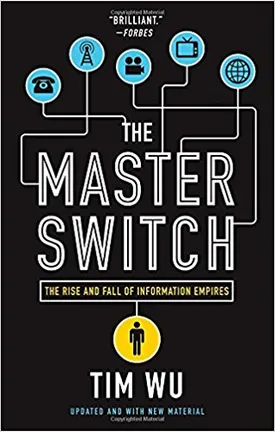The Master Switch: The Rise and Fall of Information Empires by Tim Wu
The Master Switch: The Rise and Fall of Information Empires by Tim Wu is an exploration of the arc of technological development from the invention of the telegraph to the current evolution of the internet. Wu examines how telecommunications technology has led to an evolution of media empires, the development of regulations to promote competition and protect consumer rights, and the emergence of important concepts, such as net neutrality, that shape the future of our digital world.
The book begins by looking at the early days of communication technology and how it has been used to exert control over individuals and economies. Wu takes readers through the formation of the telegraph, radio, and television industries and how each has been used to form powerful media empires. He looks at how, throughout the nineteenth and twentieth centuries, these empires have consolidated power and competed against each other in a process of “creative destruction.” Wu argues that while these empires created a means of communication that improved upon existing forms, they often wielded this power in harmful ways. He then examines how regulations were passed to force incumbents to open access to competitors, promote competition, and protect consumer rights.
The central theme of The Master Switch is that communication technologies tend to concentrate power and influence the development of media empires. Wu examines the concept of “vertical integration”, which allows large groups of companies to control various points of the communications value chain. Wu argues that over time, this concentrated power has become increasingly difficult to challenge, resulting in fewer options for consumers and higher costs for all. In particular, he looks at how this decline has affected the ability of ordinary citizens to access communications technology, often through the increased prices associated with high-quality infrastructure or monopoly control over valuable networks.
The book profiles key figures from the history of telecommunications technology, such as Theodore Vail, the engineer and founder of AT&T, David Sarnoff of RCA, and William Paley of CBS. Through these figures, Wu is able to illustrate how the concentration of power was used to create information monopolies. He also examines how this power was eventually diminished by the rise of regulators, technological advancements, and the emergence of competing services.
The Master Switch ends by looking at the rise of digital technologies and the implications for the future of the free and open internet. Wu argues that the current debate around net neutrality and the preservation of an open web is especially crucial, as the decisions made by regulators will determine the fate of the future of communications technology. Ultimately Wu warns that if concentration of power is not effectively managed, the potential of technology to advance human progress and foster an open, democratic society may be impeded.
In his book The Master Switch, Tim Wu delves into the history of communication technology and its rapid evolution in the past centuries. He explores how media empires were created, the regulations that were passed to protect consumers, and the emergence of concepts such as net neutrality that are shaping the future of our digital world today. Through engaging profiles, historical analysis, and speculative discussion, Wu argues that while technology has improved lives, it has also concentrated power in ways that will have lasting implications for the future of media and communications. It is a powerful and thought-provoking read for anyone interested in the origin and future of our ever-evolving digital world.

